Fleurs du Mal Magazine


Or see the index
Hij heeft geen idee waar Jacob begraven is. Toen heeft hij er niet naar gevraagd.
Hebben ze met z’n drieën nooit bloemen willen brengen naar zijn graf? Hij weet het niet meer. Er was te veel afstand tussen de zigeuners en de dorpelingen. Ze werden gedoogd, daar hield het mee op. Je ging er niet mee om. Dat wilden ze zelf waarschijnlijk ook niet. Ze bleven onder elkaar.
Hij rijdt door naar huis. Het is bijna twaalf uur.
Met moeite kan hij bij de bel.
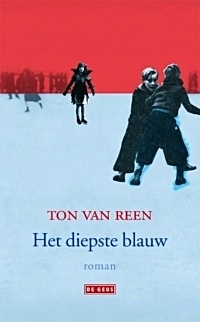 Lizet doet open.
Lizet doet open.
`Dat werd tijd. Ik zit op je te wachten.’
`Het is nog geen twaalf uur.’
`Ik wil de boel aan kant hebben. Hoe was het?’
`Geen mens. Jij niet. Niemand.’
Over die hoerenmadam praat hij niet.
Hij rijdt door naar de keuken. De tafel is gedekt. In een hoek staat de kinderwagen. De baby van zijn dochter slaapt. De kat ligt in het mandje onder in de wagen.
Lizet legt een beboterde snee brood op zijn bord en doet er een omelet op.
Hij neemt een hap. Het ei is koud. Hij schuift het bord terug.
`Is het niet goed?’
`Het smaakt niet als het koud is.’
Buiten slaat de torenklok twaalf uur. Hij rolt zijn stoel terug.
`Eet je niet?’
`Nee.’
`Doe ik daar al die moeite voor?’
`Vanochtend gooide je mijn koffie weg. Nu is het ei koud.’
`Je was beter af in dat revalidatiecentrum’, gooit ze eruit.
`Ik ben blij dat je het gezegd hebt.’
`Zo bedoel ik het niet.’
`Je krijgt je zin.’
`Dram niet zo door.’
`Ik geef je gelijk.’
Ze weet dat ze te ver is gegaan. Nu heeft hij haar in de tang, ook al is het maar voor een paar tellen.
Met de lift gaat hij naar boven. Hij kijkt niet naar de schilderijen van de Wijer bij de trap. Hij wil niets zien.
Als hij van buiten komt, ziet hij elke keer hoe klein zijn kamer is. Ze lijkt steeds kleiner te worden. Een cel. Hij wil hier weg.
Hij kijkt niet in de spiegel. Hij wil zijn kwade hoofd niet zien.
Zijn bed is niet opgemaakt. Hij sluit zijn ogen en houdt de handen voor zijn oren, om de woede in hem te bedaren. Hij moet rustig worden. Aanvallen van woede kunnen het tekort aan bloed in zijn hoofd verergeren, zodat hij een aanval van verwardheid kan krijgen. Hij wil het niet. Hij moet overeind blijven. Als hij een aanval krijgt, laat ze hem in zijn vet gaar koken. Dan komt ze niet eens naar zijn kamer om hem te verzorgen.
Ze heeft hem al eens een hele nacht in zijn rolstoel laten zitten, voor straf. Hij was zo duizelig dat hij niet bij machte was om zelf in bed te komen. Toen hij naar het toilet ging, was hij naast de pot gevallen. Pas toen had ze hem geholpen. De vernedering had meer pijn gedaan dan de blauwe plekken.
Toch moet hij eventjes gaan liggen. Plat liggen is het best voor de bloedtoevoer naar zijn hoofd. Hij glijdt vanuit de rolstoel op bed en valt achterover. Het is gelukt. Hij rukt de plaid uit de rolstoel en trekt die over zijn hoofd. Donker verzacht zijn woede.
In huis is het stil. Zijn woorden hebben pijn gedaan, daar is hij zeker van. Hij heeft het niet gewild, maar hij heeft het ook niet kunnen voorkomen.
Hoe moet hij hier weg? Nergens zitten ze te wachten op een man die thuis nog een vrouw en dochter heeft die hem kunnen verzorgen. Maar de grens is bereikt.
Kan hij zijn manuscripten meenemen? Al die mappen? Het zijn stofnesten. Daar hebben ze de pest aan in zo’n verpleeghuis.
Hij zal het dorp missen. En de kleine rivier. De kleuren en de geuren van de Wijer.
Ton van Reen: Het diepste blauw (084)
wordt vervolgd
fleursdumal.nl magazine
More in: - Book News, - Het diepste blauw, Archive Q-R, Reen, Ton van
The perfect gift for book lovers: a beautifully designed hardcover in which two of the world’s great men have a delightfully rambling conversation about the future of the book in the digital era, and decide it is here to stay.
‘The book is like the spoon: once invented, it cannot be bettered.’ Umberto Eco These days it is almost impossible to get away from discussions of whether the ‘book’ will survive the digital revolution.
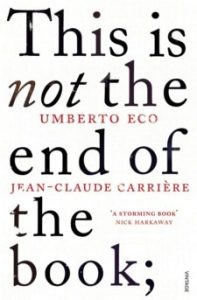 Blogs, tweets and newspaper articles on the subject appear daily, many of them repetitive, most of them admitting they don’t know what will happen. Amidst the twittering, the thoughts of Jean-Claude Carrière and Umberto Eco come as a breath of fresh air. There are few people better placed to discuss the past, present and future of the book. Both avid book collectors with a deep understanding of history, they have explored through their work the many and varied ways ideas have been represented through the ages.
Blogs, tweets and newspaper articles on the subject appear daily, many of them repetitive, most of them admitting they don’t know what will happen. Amidst the twittering, the thoughts of Jean-Claude Carrière and Umberto Eco come as a breath of fresh air. There are few people better placed to discuss the past, present and future of the book. Both avid book collectors with a deep understanding of history, they have explored through their work the many and varied ways ideas have been represented through the ages.
This thought-provoking book takes the form of a long conversation in which Carrière and Eco discuss everything from what can be defined as the first book to what is happening to knowledge now that infinite amounts of information are available at the click of a mouse. En route there are delightful digressions into personal anecdote. We find out about Eco’s first computer and the book Carrière is most sad to have sold.
Readers will close this entertaining book feeling they have had the privilege of eavesdropping on an intimate discussion between two great minds. And while, as Carrière says, the one certain thing about the future is that it is unpredictable, it is clear from this conversation that, in some form or other, the book will survive.
Umberto Eco (1932–2016) wrote fiction, literary criticism and philosophy. His first novel, The Name of the Rose, was a major international bestseller. His other works include Foucault’s Pendulum, The Island of the Day Before, Baudolino, The Mysterious Flame of Queen Loana, The Prague Cemetery and Numero Zero along with many brilliant collections of essays.
Jean-Claude Carrière is a writer, playwright and screenwriter. He is notably the co-author of Conversations About the End of Time (with Stephen Jay Gould, Umberto Eco, etc.) He has also worked with Peter Brook, Milos Forman, Buñuel, Godard and the Dalaï Lama.
This is Not the End of the Book
A conversation curated by Jean-Philippe de Tonnac
By Umberto Eco, Jean-Claude Carrière
Language & Literary Studies
Paperback
ISBN 9780099552451
2012
Vintage Publ.
352 pages
$24.99
# new books
This is Not the End of the Book
Umberto Eco & Jean-Claude Carrière
fleursdumal.nl magazine
More in: - Book Lovers, - Book News, - Book Stories, - Bookstores, Archive C-D, Archive E-F, Art & Literature News, The Art of Reading, Umberto Eco
Oliver Sacks (1933 – 2015), befaamd neuroloog, wetenschapper en arts. Sacks studeerde medicijnen in Oxford, woonde sinds 1965 in New York en werkte als hoogleraar aan de NYU School of Medicine.
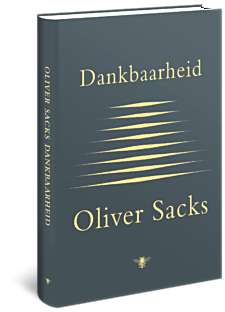 Oliver Sacks verwierf internationale roem met zijn populairwetenschappelijke boeken over de belevingswereld van zijn patiënten. Hij is de auteur van internationale bestsellers als Migraine, Ontwaken in verbijstering, De man die zijn vrouw voor een hoed hield, Stemmen zien, Een antropoloog op Mars, Musicofilia en Hallucinaties. In 2015 verscheen zijn autobiografie Onderweg. In augustus 2015 overleed hij in zijn woonplaats New York.
Oliver Sacks verwierf internationale roem met zijn populairwetenschappelijke boeken over de belevingswereld van zijn patiënten. Hij is de auteur van internationale bestsellers als Migraine, Ontwaken in verbijstering, De man die zijn vrouw voor een hoed hield, Stemmen zien, Een antropoloog op Mars, Musicofilia en Hallucinaties. In 2015 verscheen zijn autobiografie Onderweg. In augustus 2015 overleed hij in zijn woonplaats New York.
“Ik heb van mensen gehouden en zij hebben van mij gehouden, ik heb veel gekregen en ik heb iets teruggegeven, ik heb gelezen, gereisd, nagedacht en geschreven. Ik heb in contact gestaan met de wereld en de bijzondere uitwisselingen ervaren tussen een schrijver en zijn lezers. Maar in de eerste plaats ben ik op deze prachtige planeet een bewust denkend wezen geweest, een denkend dier, en dat alleen al was een enorm voorrecht en avontuur.”
In februari 2015 maakte Oliver Sacks, in een aangrijpend stuk in The New York Times, bekend dat hij ongeneeslijk ziek was. Eind augustus overleed hij in New York, 82 jaar oud. Sinds het bericht van zijn ziekte werkte hij met grote gedrevenheid verder aan de boeken die hij nog wilde afmaken. Intussen publiceerde hij een reeks essays waarin hij probeerde grip te krijgen op het verloop van zijn ziekte en de betekenis van zijn naderende dood.
In Dankbaarheid zijn deze stukken bijeengebracht. Het is een boek dat getuigt van een grote veerkracht en menselijkheid: het laat zien hoe iemand die geconfronteerd wordt met het naderende einde toch het leven kan vieren en dankbaar kan zijn.
Auteur: Oliver Sacks
Titel: Dankbaarheid
Taal: Nederlands
Hardcover
2015
1e druk
80 pagina’s
ISBN13 9789023497912
Uitgever De Bezige Bij
Vertaald door Luud Dorresteijn
€ 12,99
# new books
Oliver Sacks
Dankbaarheid. Essays
fleursdumal.nl magazine
More in: - Book News, - Book Stories, Archive S-T, AUDIO, CINEMA, RADIO & TV, Oliver Sacks, Psychiatric hospitals
In this book, Gerald Janecek provides a comprehensive account of Moscow Conceptualist poetry and performance, arguably the most important development in the arts of the late Soviet period and yet one underappreciated in the West.
 Such innovative poets as Vsevolod Nekrasov, Lev Rubinstein, and Dmitry Prigov are among the most prominent literary figures of Russia in the 1980s and 1990s, yet they are virtually unknown outside Russia. The same is true of the numerous active Russian performance art groups, especially the pioneering Collective Actions group, led by the brilliantly inventive Andrey Monastyrsky.
Such innovative poets as Vsevolod Nekrasov, Lev Rubinstein, and Dmitry Prigov are among the most prominent literary figures of Russia in the 1980s and 1990s, yet they are virtually unknown outside Russia. The same is true of the numerous active Russian performance art groups, especially the pioneering Collective Actions group, led by the brilliantly inventive Andrey Monastyrsky.
Everything Has Already Been Written strives to make Moscow Conceptualism more accessible, to break the language barrier and to foster understanding among an international readership by thoroughly discussing a broad range of specific works and theories.
Janecek’s study is the first comprehensive analysis of Moscow Conceptualist poetry and theory, vital for an understanding of Russian culture in the post-Conceptualist era.
Gerald Janecek: is a professor emeritus of Russian at the University of Kentucky. He is the author of The Look of Russian Literature: Avant-Garde Visual Experiments, 1900–1930; ZAUM: The Transrational Poetry of Russian Futurism; and Sight and Sound Entwined: Studies of the New Russian Poetry; and the editor of Staging the Image: Dmitry Prigov as Artist and Writer.
Everything Has Already Been Written.
Moscow Conceptualist Poetry and Performance
Gerald Janecek (Author)
Publication Date: December 2018
Studies in Russian Literature and Theory
312 pages
Northwestern University Press
-Paper Text – $39.95
ISBN 978-0-8101-3901-5
-Cloth Text – $120.00
ISBN 978-0-8101-3902-2
# new books
Moscow Conceptualist Poetry and Performance
Gerald Janecek
fleursdumal.nl magazine
More in: #Archive A-Z Sound Poetry, #Archive Concrete & Visual Poetry, #Editors Choice Archiv, - Book News, Archive I-J, Art & Literature News, Chlebnikov, Velimir, Conceptual writing, FDM Art Gallery, FLUXUS LEGACY, Kharms (Charms), Daniil, Majakovsky, Vladimir, Performing arts, REPRESSION OF WRITERS, JOURNALISTS & ARTISTS, Visual & Concrete Poetry
His Hands Were Gentle brings together, for the first time in both Spanish and English, the best of Víctor Jara’s lyrics, from early songs like ‘El arado’ to ‘Estadio Chile’ written in the hours before his execution there.
They reveal Jara as an ardent political poet, an eloquent advocate for the peasantry from which he arose, a socialist visionary and a poetic balladeer of the highest order.
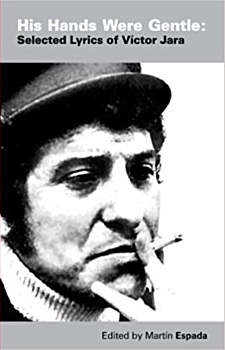 Translations by Martín Espada, Eduardo Embry, John Green, Joan Jara and Adrian Mitchell.
Translations by Martín Espada, Eduardo Embry, John Green, Joan Jara and Adrian Mitchell.
Foreword by Joan Jara, Preface by Emma Thompson, Introduction by Martín Espada.
Víctor Jara (1932–73) was a legendary Chilean singer, songwriter, guitarist and theatre director. Between 1966 and 1973 he released eight albums, such as Canto libre and El derecho de vivir en paz. He was a member of the Communist Party of Chile, a prominent supporter of Salvador Allende’s Popular Unity government, and a leader of the New Song Movement during the cultural renaissance of the Allende years. In the days following the US–backed military coup of September 11, 1973, Jara was arrested, imprisoned and murdered. His recordings were banned for many years in Chile.
On my way to work
I think of you,
through the streets of the town
I think of you,
when I look at the faces
through steamy windows
not knowing who they are, where they go…
I think of you
my love, I think of you
of you, compañera of my life
and of the future
of the bitter hours and the happiness
of being able to live
working at the beginning of a story
without knowing the end.
(…)
When I come home
you are there
and we weave our dreams together…
Working at the beginning of a story
without knowing the end.
(From: On My Way to Work/ Cuando voy al trabajo.
Translated by Joan Jara)
His Hands Were Gentle brings together, for the first time in both Spanish and English, the best of V¡ctor Jara’s lyrics, from early songs like ‘El arado’ to ‘Estadio Chile’ written in the hours before his execution there. They reveal Jara as an ardent political poet, an eloquent advocate for the peasantry from which he arose, a socialist visionary and a poetic balladeer of the highest order. Translations by Martin Espada, Eduardo Embry, John Green, Joan Jara and Adrian Mitchell.
His Hands Were Gentle
Selected Lyrics of Victor Jara
Martin Espada (Editor)
Translations by Martín Espada, Eduardo Embry, John Green, Joan Jara and Adrian Mitchell.
Foreword by Joan Jara,
Preface by Emma Thompson,
Introduction by Martín Espada.
Paperback
84 pages
Publisher: Smokestack Books
Bilingual edition
2014
Language: English
ISBN-10: 0956814417
ISBN-13: 978-0956814418
Price: £8.95
# more poetry
His Hands Were Gentle
Selected Lyrics of Victor Jara
fleursdumal.nl magazine
More in: # Music Archive, #Editors Choice Archiv, - Book News, Archive I-J, Art & Literature News
Stairs and Whispers: D/deaf and Disabled Poets Write Back, edited by Sandra Alland, Khairani Barokka and Daniel Sluman, is a ground-breaking anthology examining UK disabled and D/deaf poetics.
Packed with fierce poetry, essays, photos and links to accessible online videos and audio recordings, it showcases a diversity of opinions and survival strategies for an ableist world.
With contributions that span Vispo to Surrealism, and range from hard-hitting political commentary to intimate lyrical pieces, these poets refuse to perform or inspire according to tired old narratives.
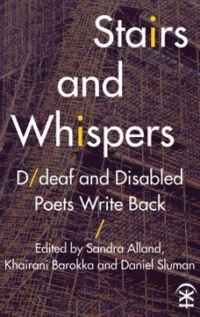 With poetry & prose by: Aaron Williamson, Abi Palmer, Abigail Penny, Alec Finlay, Alison Smith, Andra Simons, Angela Readman, Bea Webster, Cath Nichols, Catherine Edmunds, Cathy Bryant, Claire Cunningham, Clare Hill, Colin Hambrook, Daniel Sluman, Debjani Chatterjee, Donna Williams, El Clarke, Eleanor Ward, Emily Ingram, Gary Austin Quinn, Georgi Gill, Giles L. Turnbull, Gram Joel Davies, Grant Tarbard, Holly Magill, Isha, Jackie Hagan, Jacqueline Pemberton, Joanne Limburg, Julie McNamara, Karen Hoy, Khairani Barokka, Kitty Coles, Kuli Kohli, Lisa Kelly, Lydia Popowich, Mark Mace Smith, Markie Burnhope, Michelle Green, Miki Byrne, Miss Jacqui, Naomi Woddis, Nuala Watt, Rachael Boast, Raisa Kabir, Raymond Antrobus, Rosamund McCullain, Rose Cook, Sandra Alland, Saradha Soobrayen, Sarah Golightley, sean burn, Stephanie Conn
With poetry & prose by: Aaron Williamson, Abi Palmer, Abigail Penny, Alec Finlay, Alison Smith, Andra Simons, Angela Readman, Bea Webster, Cath Nichols, Catherine Edmunds, Cathy Bryant, Claire Cunningham, Clare Hill, Colin Hambrook, Daniel Sluman, Debjani Chatterjee, Donna Williams, El Clarke, Eleanor Ward, Emily Ingram, Gary Austin Quinn, Georgi Gill, Giles L. Turnbull, Gram Joel Davies, Grant Tarbard, Holly Magill, Isha, Jackie Hagan, Jacqueline Pemberton, Joanne Limburg, Julie McNamara, Karen Hoy, Khairani Barokka, Kitty Coles, Kuli Kohli, Lisa Kelly, Lydia Popowich, Mark Mace Smith, Markie Burnhope, Michelle Green, Miki Byrne, Miss Jacqui, Naomi Woddis, Nuala Watt, Rachael Boast, Raisa Kabir, Raymond Antrobus, Rosamund McCullain, Rose Cook, Sandra Alland, Saradha Soobrayen, Sarah Golightley, sean burn, Stephanie Conn
About the Editors: Alland’s collections include Blissful Times (BookThug, 2007) and Naturally Speaking (espresso, 2012). Barokka’s works include Indigenous Species (Tilted Axis, 2016) and Rope (Nine Arches, 2017). Sluman has two books with Nine Arches: Absence has a weight of its own (2012) and The Terrible (2015).
Stairs and Whispers:
D/deaf and Disabled Poets Write Back
Edited by Sandra Alland, Khairani Barokka & Daniel Sluman
Paperback
264 pages
Publisher: Nine Arches Press
2017
Language: English
ISBN-10: 1911027190
ISBN-13: 978-1911027195
Product Dimensions: 13.8 x 1 x 21.6 cm
eBook: Available at Amazon Kindle Store from September 2017
Discover the audio content that accompanies this book available on Soundcloud
Discover the video content that accompanies this book on Youtube
Price: £14.99
More information on website Nine Arches Press (http://ninearchespress.com/)
# more books
Stairs and Whispers:
D/deaf and Disabled Poets Write Back
fleursdumal.nl magazine
More in: #Editors Choice Archiv, #More Poetry Archives, - Audiobooks, - Book News, - Book Stories, Art & Literature News, AUDIO, CINEMA, RADIO & TV, The Art of Reading
PARK vierde in oktober 2018 het vijfjarig bestaan en maakte een boek waarin de activiteiten in de periode 2016-2018 zijn vastgelegd.
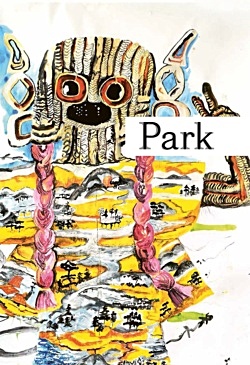 Het rijk geïllustreerde full-colour boek, met teksten van Esther Porcelijn en Rob Moonen, is opnieuw vormgegeven door Berry van Gerwen.
Het rijk geïllustreerde full-colour boek, met teksten van Esther Porcelijn en Rob Moonen, is opnieuw vormgegeven door Berry van Gerwen.
Het telt ruim 240 pagina’s en heeft een oplage van 600 stuks.
Alle tentoonstellingsprojecten, de bijna 200 exposerende kunstenaars en de extra activiteiten in de periode 2016-2018 komen aan bod. Het is de opvolger van het eerder verschenen ‘PARK 2013-2015‘.
Het boek kost € 20,- inclusief BTW, exclusief eventuele verzendkosten. Het verschijnt verschijnt op zondag 16 december 2018 tijdens een boekpresentatie om 16:00 uur bij PARK.
U kunt uw exemplaar ook bestellen via shop@park013.nl
PARK 2016-2018
Teksten van Esther Porcelijn en Rob Moonen
Vormgeving door Berry van Gerwen
PARK
Platform for visual arts
240 pagina’s
Oplage 600 stuks
€ 20,-
PARK is een kunstinitiatief opgericht in 2013 door Rob Moonen in samenwerking met een zestal andere Tilburgse kunstenaars. Op dit moment bestaat de PARK werkgroep uit Linda Arts, René Korten, Rob Moonen en Liza Voetman.
PARK richt zich op actuele ontwikkelingen binnen de hedendaagse kunst én op kunstenaars met gedegen ervaring en bewezen kwaliteit. Er wordt plek geboden aan regionale collega’s maar ook aan landelijk of internationaal opererende kunstenaars, juist om een positieve bijdrage aan de discussie over actuele kunst tot stand te brengen. De werkgroep ambieert het podium van belang te laten zijn op landelijk niveau, maar bij elk project wordt met nadruk gezocht naar een inhoudelijke koppeling met de stad. De werkgroep is er van overtuigd dat samenwerking met andere partijen de zichtbaarheid en functionaliteit van de plek zal versterken, maar ook dat de plek een waardevolle stimulans voor de beeldende kunst in de stad en de regio zal kunnen zijn.
PARK wil steeds nieuwe verbindingen leggen, bijvoorbeeld door (internationaal opererende) curatoren uit te nodigen om kennis te nemen van de keur aan regionale beeldende kunstenaars en daarvan mogelijk enkele op te nemen in een tentoonstellingsproject. PARK wil een bijdrage leveren aan de ontwikkeling van een gunstig productie- en vestigingsklimaat voor beeldend kunstenaars uit de regio door deze in contact te brengen met een nationaal en internationaal netwerk.
Per jaar worden er vijf projecten gerealiseerd met waar mogelijk een bijpassend raamprogramma in de vorm van lezingen, kunstenaarsgesprekken, muziek en film.
PARK
Wilhelminapark 53, 5041 ED Tilburg
info@park013.nl
Twitter.com/ParkTilburg
Facebook.com/Park013
Instagram.com/platform_for_visual_arts
Tijdens tentoonstellingen geopend:
vrijdag 13.00 – 17.00 uur
zaterdag 13.00 – 17.00 uur
zondag 13.00 – 17.00 uur
Toegang is gratis
PARK ligt op 10 minuten loopafstand van het Centraal Station Tilburg in de nabijheid van Museum De Pont. Er is beperkt gratis parkeergelegenheid voor de deur.
# new books
visual arts
fleursdumal.nl magazine
More in: #Editors Choice Archiv, - Book News, Architecture, Art & Literature News, Art Criticism, FDM Art Gallery, Linda Arts, Park, Performing arts, Porcelijn, Esther, Porcelijn, Esther, Sculpture, The talk of the town
`Doe de deur achter je dicht en loop maar naar boven’, roept Tijgers moeder, de lieve roodharige heks.
 Mels holt de trap op, zijn vingers roffelend langs de spijlen. De deur van Tijgers slaapkamer staat open. Thija is er al. Ze zit op het hoofdeinde naast Tijger, haar arm om zijn hals. Hun ogen zijn gericht op iets wat voor Tijger op het bed ligt, maar Mels kan het niet zien.
Mels holt de trap op, zijn vingers roffelend langs de spijlen. De deur van Tijgers slaapkamer staat open. Thija is er al. Ze zit op het hoofdeinde naast Tijger, haar arm om zijn hals. Hun ogen zijn gericht op iets wat voor Tijger op het bed ligt, maar Mels kan het niet zien.
Ze hebben hem niet gehoord. Geruisloos gaat Mels achterwaarts de trap af, opent zacht de voordeur en sluipt naar buiten. Met kloppend hart loopt hij naar de Wijer, de handen gebald in zijn broekzakken, alsof hij iemand wil wurgen.
Pas laat komt hij thuis. Het is al donker. Zijn moeder vraagt niets, ze begrijpt altijd alles.
Ze geeft hem thee met een stapel biscuitjes en wacht tot hij tot rust is gekomen.
`Ik heb slecht nieuws’, zegt ze dan. `Wil je het horen. Of is het voor vandaag te veel?’
`Zeg maar.’
`Die zigeunerjongen is gestorven.’
`Hij wilde nog lang niet dood.’ Mels is geschokt. En kwaad. `Het is niet eerlijk.’
`In het leven is niets eerlijk. Wat je graag wilt hebben, krijg je nooit.’
Denkt ze aan zijn vader? Hij vindt het verschrikkelijk dat die twee zo verschillend zijn en bijna nooit met elkaar praten. Zou zijn moeder gelukkiger zijn geweest met een andere man?
Omdat zijn vader er niet is, kan hij wat tegen zijn moeder aanhangen op de bank, op zoek naar troost. Zijn vader wil nooit dat hij zich door haar laat aanhalen. Hij vindt het iets voor moederskindjes.
Die nacht kan hij niet slapen. De hele nacht klinkt er vioolmuziek van heel ver. Woedende muziek. Alsof er wolven naar de maan huilen.
Als het nog donker is, staat hij al op en zoekt op de radio naar verre zenders. Vier uur. Tijd voor nachtraven. De fluitende en joelende tonen die van wie weet waar komen, stemmen hem rustig. Hij weet zeker dat het geheime boodschappen zijn. Misschien zijn er berichten bij uit China. Van de Chinese communisten voor de communisten hier die in het land geheime cellen opzetten, om later, samen met de Chinese legers, de macht te grijpen. Grootvader Rudolf weet zeker dat het ooit zover komt. Hij heeft visioenen van horden grijnzende gele mannetjes die het land onder de voet lopen. Voor elk van hen die sneuvelt komen er tientallen anderen.
Volgens grootvader hebben de Chinezen meer ruimte nodig in de wereld omdat ze met zo veel zijn. `Ze planten zich voort als ratten’, zegt hij. `Alleen maar om de wereld te overheersen. Wij zijn hier al bijna net zover. In het Rood Dorp zijn ook gezinnen met tien of twaalf kinderen. Die leggen rode lopers voor hen uit. Heel Europa zal worden platgewalst door het Gele Gevaar.’ `Is dat net zoiets als de gele verf?’ `Jazeker, mijn jongen, alleen wat erger.’ Maar grootvader Bernhard denkt er precies het tegenovergestelde van. Hij zegt juist dat de Chinezen liever in China blijven en dat China groot genoeg voor hen is. `En als ze dan toch zullen komen, dan zal ik ze vriendelijk ontvangen. In China heb ik alleen maar aardige mensen gezien.’
Mels probeert de code van een zender die een aantal verschillende pieptonen laat horen, te ontcijferen. Drie pieptonen in veel verschillende combinaties. Hij schrijft zijn vingers blauw op een velletje papier, maar alle rijtjes naast elkaar laten geen enkel verband met elkaar zien. Is het een zender die er juist voor bedoeld is om de vijand in de war te brengen? Hij komt er niet eens achter van wie de zender is en uit welk land hij zendt.
Al vroeg staat hij bij Thija aan de deur. Tijger heeft hem voorbij zien komen en volgt hem op de voet.
`Waar was je gisteren?’ vraagt Thija.
`Ik kon niet’, zegt hij. `Heb jij vannacht die viool ook gehoord?’
`Ik heb niets gehoord.’
`Jacob is dood’, zegt Mels. `Het moet zijn vader zijn geweest.’
`We wisten dat hij doodging.’
`We hadden vaker naar hem toe moeten gaan.’
`Stom, om zoiets achteraf te zeggen’, zegt Thija.
Ton van Reen: Het diepste blauw (083)
wordt vervolgd
fleursdumal.nl magazine
More in: - Book News, - Het diepste blauw, Archive Q-R, Reen, Ton van
Layering joy and urgent defiance—against physical and cultural erasure, against white supremacy whether intangible or graven in stone—Trethewey’s work gives pedestal and witness to unsung icons.
 Monument, Trethewey’s first retrospective, draws together verse that delineates the stories of working class African American women, a mixed-race prostitute, one of the first black Civil War regiments, mestizo and mulatto figures in Casta paintings, Gulf coast victims of Katrina. Through the collection, inlaid and inextricable, winds the poet’s own family history of trauma and loss, resilience and love.
Monument, Trethewey’s first retrospective, draws together verse that delineates the stories of working class African American women, a mixed-race prostitute, one of the first black Civil War regiments, mestizo and mulatto figures in Casta paintings, Gulf coast victims of Katrina. Through the collection, inlaid and inextricable, winds the poet’s own family history of trauma and loss, resilience and love.
In this setting, each section, each poem drawn from an “opus of classics both elegant and necessary,”* weaves and interlocks with those that come before and those that follow.
As a whole, Monument casts new light on the trauma of our national wounds, our shared history. This is a poet’s remarkable labor to source evidence, persistence, and strength from the past in order to change the very foundation of the vocabulary we use to speak about race, gender, and our collective future.
*Academy of American Poets’ chancellor Marilyn Nelson
Natasha Trethewey, two term U.S. Poet Laureate, Pulitzer Prize winner, and 2017 Heinz Award recipient, has written five collections of poetry and one book of nonfiction. An American Academy of Arts and Sciences fellow, she is currently Board of Trustees professor of English at Northwestern University. She lives in Evanston, Illinois.
Monument: Poems New and Selected
by Natasha Trethewey
Poetry
Houghton Mifflin Harcourt
Format: Hardcover
ISBN-13/EAN: 9781328507846
ISBN-10: 132850784X
Pages: 208
Price: $26.00
November 6, 2018
# new books
Natasha Trethewey
Monument: Poems New and Selected
fleursdumal.nl magazine
More in: - Book News, - Bookstores, Archive S-T, Art & Literature News
In Her Own Words: The Life and Poetry of Aelia Eudocia is the first full-length study to examine Eudocia’s writings as a unified whole and to situate them within their wider fifth-century literary, social, and religious contexts.
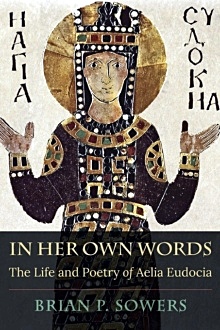 Responsible for over 3,000 lines of extant poetry, Eudocia is one of the best-preserved ancient female poets. Because she wrote in a literary mode frequently suppressed by proto-orthodox (male) leaders, much of her poetry does not survive, and what does survive remains understudied and underappreciated.
Responsible for over 3,000 lines of extant poetry, Eudocia is one of the best-preserved ancient female poets. Because she wrote in a literary mode frequently suppressed by proto-orthodox (male) leaders, much of her poetry does not survive, and what does survive remains understudied and underappreciated.
This book represents a detailed investigation into Eudocia’s works: her epigraphic poem in honor of the therapeutic bath at Hammat Gader, her Homeric cento—a poetic paraphrase of the Bible using lines from Homer—and her epic on the fictional magician-turned-Christian, Cyprian of Antioch.
Reading her poetry as a whole and in context, Eudocia emerges as an exceptional author representing three unique late-antique communities: poets interested in preserving and transforming classical literature; Christians whose religious views positioned them outside and against traditional power structures; and women who challenged social, religious, and literary boundaries.
Brian P. Sowers is Assistant Professor of Classics at Brooklyn College, City University of New York.
In Her Own Words
The Life and Poetry of Aelia Eudocia
Brian P. Sowers
Hellenic Studies Series 80
Harvard University Press
Paperback
ISBN 9780674987371
275 pages
€22.50
Publication: January 2019
# new books
Aelia Eudocia
Life and work – poetry
fleursdumal.nl magazine
More in: - Book News, Archive E-F, Archive E-F, Archive S-T, Art & Literature News, CLASSIC POETRY
Mels klopt zijn schouders af, een routinehandeling, altijd bang dat Lizet roos op zijn jas vindt. Ze heeft een hekel aan roos. Vaak borstelt ze de schouders van zijn jas af. Op straat moeten de mensen weten dat ze voor hem zorgt.
 Op weg naar huis passeert hij het voormalige huis van Tijger, waarin nu de jongere zus van Tijger woont. Met haar heeft hij nauwelijks contact. Ze groeten elkaar. Soms maken ze een praatje, maar nooit over vroeger. Er zijn voor haar weinig mooie herinneringen overgebleven.
Op weg naar huis passeert hij het voormalige huis van Tijger, waarin nu de jongere zus van Tijger woont. Met haar heeft hij nauwelijks contact. Ze groeten elkaar. Soms maken ze een praatje, maar nooit over vroeger. Er zijn voor haar weinig mooie herinneringen overgebleven.
Haar vader die overleden is toen ze net geboren was. Tijger die ze nauwelijks heeft gekend. Haar moeder die gek was geworden van verdriet en zichzelf had opgeknoopt op de zolder, waar haar dochter, nog net geen zestien, haar had gevonden. Misschien dat de dochter zich daarom nooit aan iemand heeft kunnen hechten. Drie keer is ze getrouwd geweest, drie keer zijn de mannen vertrokken.
Hij kijkt altijd weer naar die deur. Nog steeds dezelfde deur, dezelfde vorm, maar in de loop der jaren met vele kleuren verf bestreken, vaak er afgebrand en weer opnieuw geschilderd.
Alle kleuren heeft de deur gehad, passend bij de stemming van de bewoners. Grijs in de jaren van Tijgers jeugd. Paars toen de jongere zus er woonde met een jonge man die aan yoga deed en elke dag op zijn kop voor het raam stond. Groen toen ze er woonde met een langharige man die dag en nacht blokfluit speelde en die haar twee kinderen naliet toen hij vertrok voor een wereldreis waarvan hij nooit was teruggekomen. Rood toen ze met een andere man ging samenwonen. En weer grijs, omdat die man zomaar verdwenen was en haar met een derde kind liet zitten. Al haar kindjes heeft ze rood haar meegegeven, als eerbetoon aan haar moeder.
Ton van Reen: Het diepste blauw (082)
wordt vervolgd
fleursdumal.nl magazine
More in: - Book News, - Het diepste blauw, Archive Q-R, Reen, Ton van
Mort d’une surdose d’opium en 1919 à l’âge de vingt-trois ans, alors qu’il est encore sous l’uniforme, Jacques Vaché est reconnu comme celui par qui le surréalisme est arrivé.
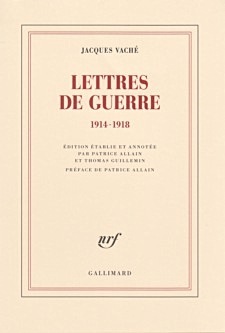 Du premier Manifeste à ses derniers Entretiens, André Breton aura toujours célébré celui qu’il appelait «l’homme que j’ai le plus aimé au monde».
Du premier Manifeste à ses derniers Entretiens, André Breton aura toujours célébré celui qu’il appelait «l’homme que j’ai le plus aimé au monde».
Et quinze Lettres de guerre, envoyées depuis le front à son ami poète ainsi qu’à Théodore Fraenkel et Louis Aragon, auront suffi pour que Vaché devienne l’arme secrète de plusieurs générations.
Breton révélait en 1919 son «Umour» sans H, surgi au milieu des combats, l’expression poétique la plus pure de l’humour noir et de la «désertion intérieure».
Présenter pour la première fois l’intégralité des lettres écrites par Jacques Vaché à sa famille et à ses amis pendant la guerre (158 dont 23 totalement inédites) permet de marquer le point de départ d’une aventure moderne et de mettre en lumière le soldat en action, la vocation prometteuse du dessinateur et la singularité du «dandy des tranchées».
Jacques Vaché:
Lettres de guerre (1914-1918)
Édition de Patrice Allain et Thomas Guillemin.
Préface de Patrice Allain
Collection Blanche, Gallimard
Parution: 08-11-2018
480 pages,
ill.,
140 x 205 mm
Achevé d’imprimer: 01-10-2018
Genre : Correspondances
Prix: 24,00 €
# new books
Jacques Vaché:
Lettres de guerre (1914-1918)
fleursdumal.nl magazine
More in: #Biography Archives, *War Poetry Archive, - Book News, - Bookstores, Archive U-V, Archive U-V, Art & Literature News, Jacques Vaché, Opium-Eaters, Vaché, Jacques
Thank you for reading Fleurs du Mal - magazine for art & literature